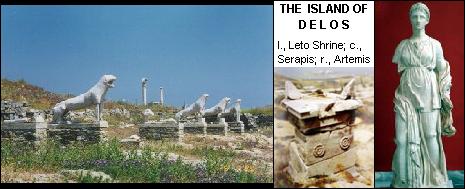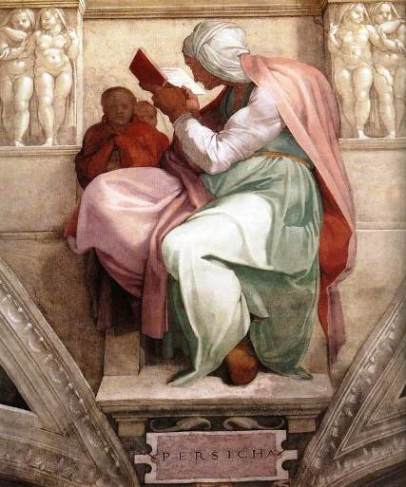DELPHOS, now called Castri, the capital of Phocis, in Greece, was anciently much celebrated for its Temple and Oracle of Apollo. It was also called 'Pytho', by the poets; from the serpent Python, which Apollo killed in this place. Pausanias, however, says that this name Pytho was given to the city of Delphos, by Pythis, son of Delphus, and grandson of Lycorus. The Greek historians gave to this city the name of Delphos, which some suppose to have been so called from ‘Adelphoi,’ brethren, because Apollo and his brother Bacchus were both worshipped there; and others, with greater probability, derive the name from Delphos, 'single', or 'solitary', referring to the retired situation of the city among the mountains.
Justin questions, which was the most worthy of admiration, the fortification of the place, or the majesty of the god, who here delivered his oracles. The Temple of Apollo occupied a large space, and many streets opened to it. The first discovery which laid the foundation of the extraordinary veneration in which the Oracle of Delphos was held, and of the riches accumulated in the temple, is said to have been occasioned by some goats which were feeding on mount Parnassus, near a deep and large cavern, with a narrow entrance. These goats having been observed by the goat-herd, Coretas, to frisk and leap after a strange manner, and to utter unusual sounds immediately upon their approach to the mouth of the cavern, he had the curiosity to view it, and found himself seized with the like fit of madness, skipping, dancing, and fortelling things to come.
At the news of this discovery, multitudes flocked thither, many of whom were possessed with such frantic enthusiasm, that they threw themselves headlong into the opening of the cavern; insomuch, that it was necessary to issue an edict, forbidding all persons to approach it. This surprising place was treated with singular veneration, and was soon covered with a kind of chapel, which was originally made of laurel boughs, and resembled a large hut. This, according to the Phocian tradition, was surrounded by one of wax, raised up by bees. After this a third was built of solid copper, said to have been the workmanship of Vulcan.
This last was destroyed, by an earthquake, or, according to some authors, by fire, which melted the copper; and then a sumptuous Temple, altogether of stone, was erected by two excellent architects, Trophimus and Agamedes. This edifice was destroyed by fire in the 58th Olympiad, or 548 years B. C. The Amphictyons proposed to be at the charge of building another; but the Alcmeonides, a rich family of Athens, came to Delphos, obtained the honor of executing the building, and made it more magnificent than they had at first proposed. The riches of this Temple, amassed by the donations of those who frequented it and consulted the Oracle, exposed it to various depredations. At length the Gauls, under the conduct of Brennus, came hither for the same purpose, about 278 years B. C.; but they were repulsed with great slaughter. Last of all,Nero robbed it of 500 of its most precious brazen and golden statues.
It has not been ascertained at what time this Oracle was founded. It is certain, however, that Apollo was not the first who was consulted here. Aeschylus, in his tragedy of the Eumenides, says, Terra was the first who issued oracles at Delphi; after her Themis, then Phoebe, another daughter of Terra, and, as it is said, mother of Latona, and grandmother to Apollo. Pausanias says, that before Themis, Terra and Neptune had delivered oracles in this place, and some say that Saturn had also been consulted here. At length the Oracle of Apollo became established and permanent; and such was its reputation, and such were the multitudes from all parts that came to consult it, that the riches which were thus brought into the temple and city, became so considerable as to be compared with those of the Persian kings.
About the time when this Oracle was first discovered, the whole mystery requisite for obtaining the prophetic gift, is said to have been merely to approach the cavern and inhale the vapour that issued from it; and then the god inspired all persons indiscriminately; but at length several enthusiasts, in the excess of their fury, having thrown themselves headlong into the cavern, it was thought expedient to contrive a prevention of this accident, which frequently occurred. Accordingly, the priests placed over the hole, whence the vapour issued, a machine which they called "a tripod," because it had three feet, and commissioned a woman to seat herself in it, where she might inhale the vapour without danger, because the three feet of the machine stood firmly upon the rock. This Priestess was named Pythia+, from the serpent Python, slain by Apollo, or from the Greek 'puthesthai', signifying 'to inquire', because people came to Delphi to consult this deity. The females, first employed, were virgins selected with great precaution - but the only qualificationnecessary was to be able to speak and repeat what the god dictated.
"First, in this prayer of mine, I give the place of highest honor among the gods to the first prophet, Gaia; and after her to Themis* for she was the second to take this oracular seat of her mother, as legend tells. And in the third allotment, with Themis’ consent and not by force, another Titan, child of Gaia, Phoebe, took her seat here. She gave it as a birthday gift to Phoebus [Apollo], who has his name from Phoebe."

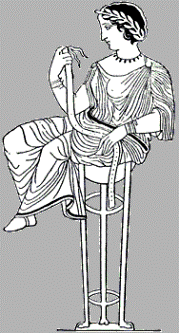




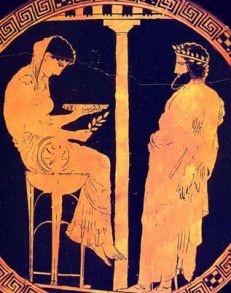
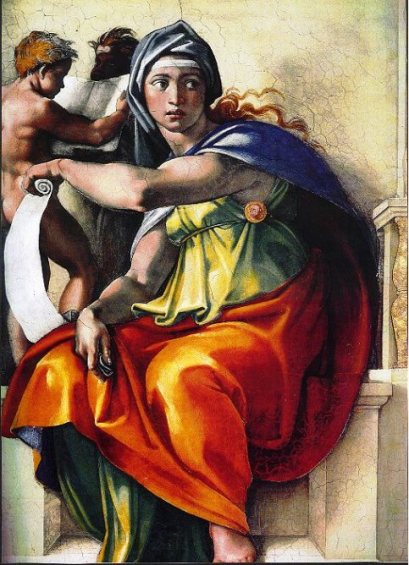

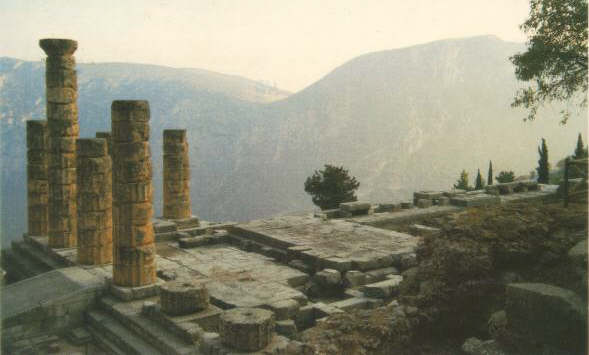 nor lascivious behaviour might bring the office, the religion, or the sanctity of the place into contempt. There was originally but one Pythia, besides subordinate priests, but afterwards two were chosen, and sometimes more. The most celebrated of all these is Phemonoe who is supposed by some to have been the first who gave oracles at Delphi. The oracles were always delivered in hexameter verses, a custom which was some time after discontinued. The Pythia was consulted only one month in the year, about the spring. It was always required, that those who consulted the oracle should make large presents to Apollo, and from thence arose the opulence, splendour, and the magnificence of the celebrated temple of Delphi. Sacrifices were also offered to the divinity, and if the omens proved unfavorable, the priestess refused to give an answer. There were generally five priests who assisted at the offering of the sacrifices, and there was also another who attended the Pythia, and assisted her in receiving the oracle.
nor lascivious behaviour might bring the office, the religion, or the sanctity of the place into contempt. There was originally but one Pythia, besides subordinate priests, but afterwards two were chosen, and sometimes more. The most celebrated of all these is Phemonoe who is supposed by some to have been the first who gave oracles at Delphi. The oracles were always delivered in hexameter verses, a custom which was some time after discontinued. The Pythia was consulted only one month in the year, about the spring. It was always required, that those who consulted the oracle should make large presents to Apollo, and from thence arose the opulence, splendour, and the magnificence of the celebrated temple of Delphi. Sacrifices were also offered to the divinity, and if the omens proved unfavorable, the priestess refused to give an answer. There were generally five priests who assisted at the offering of the sacrifices, and there was also another who attended the Pythia, and assisted her in receiving the oracle.
